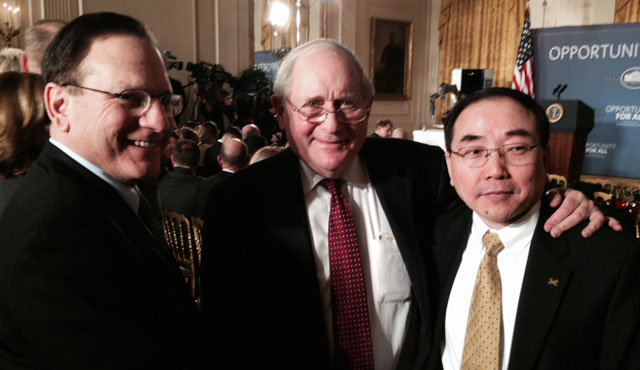
Alan Taub (MSE), Michigan Senator Carl Levin and Jack Hu (ME) at the White House.
University of Michigan (U-M) Mechanical Engineering (ME) faculty are playing key roles in two new national manufacturing innovation institutes announced by President Obama in early 2014. The new institutes, part of the National Network for Manufacturing Innovation, will advance manufacturing technologies and help to boost U.S. competitiveness.
The U.S. Department of Defense selected a consortium of investigators, led by U-M, the Edison Welding Institute and Ohio State University, to head the new American Lightweight Materials Manufacturing Innovation Institute, or ALMMII. Many nonprofit and industry partners will participate in the nearly $148 million effort, to be based outside of Detroit, in Canton, Michigan.
Professor Alan Taub of Materials Science and Engineering is serving as the ALMMII chief technical officer. Mechanical Engineering Professor S. Jack Hu, currently also U-M’s interim vice president for research, represents U-M on the ALMMII board of directors.
The ALMMII will support the U.S. manufacturing sector by developing and implementing innovative manufacturing technologies that enable cost-effective lightweighting of components used in ground-, water- and air-based transportation systems.
The institute’s investigators will be undertaking research projects along the spectrum of manufacturing technology as it relates to lightweight materials, from the materials themselves to their integration into components and subsystems as well as workforce education and training.
“Detroit is the world capital of automotive manufacturing and lightweighting in cars and trucks is of keen interest to auto manufacturers today,” said Hu. “Couple that with the tremendous expertise and research base we have here at U-M and around the Midwest, and the location and timing are an excellent fit.”
A number of ME faculty will be involved with the ALMMII’s technical projects, including Hu, Albert Shih, Elijah Kannatey-Asibu, Steve Skerlos, Miki Banu, Jyotirmoy Mazumder and Jun Ni.
ME Professor Jun Ni, the Shien-Ming (Sam) Wu Collegiate Professor of Manufacturing, also led U-M participation in a second manufacturing innovation institute, the Digital Manufacturing and Design Innovation Institute (DMDII). Led by the Chicago-based UI LABS, the $300 million DMDII includes almost two-dozen institutions and more than 100 companies.
“Advanced digital modeling and simulation tools can greatly reduce the time from concept to market and optimize our design and manufacturing processes,” explained Ni, who serves as U-M coordinator for the DMDII. “That extends to manufacturers’ supply chains and sales and marketing networks. If we can improve all those business processes using technology, the U.S. can better compete globally.”
Both institutes are expected to offer research and internship opportunities for U-M faculty and students. With a focus on technologies with a readiness level of between four and seven, the two MIIs will ensure that research projects move rapidly toward implementation and commercialization, thereby creating jobs and improving workforce preparedness.
University of Michigan ME roots run deep beneath the National Network for Manufacturing Innovation. ME Professor Sridhar Kota, the Herrick Professor of Engineering, served as assistant director for advanced manufacturing at the White House from 2009 to 2012. A major priority was to foster innovation and bridge the gap between basic research and manufacturing readiness. In 2011, Kota also helped create President Obama’s Advanced Manufacturing Partnership (AMP). Hu and U-M President Emerita Mary Sue Coleman served on a working group of the AMP.
“To be able to help define a national agenda for manufacturing research and innovation and be a key participant on two winning manufacturing innovation institute proposals only underscores the strength of U-M’s research and educational programs in manufacturing,” said Hu.